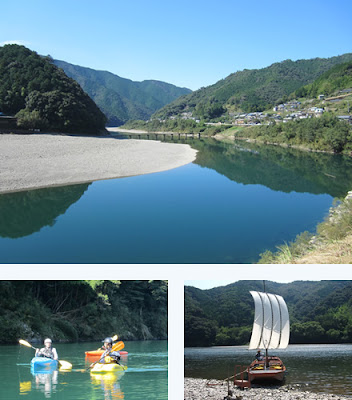Shikoku ISLANDS - JAPAN
Shikoku, the smallest of Japan’s major islands, is famously encircled by a 1,200km, 88-temple Buddhist pilgrimage route (henro) honoring the 9th-century monk Kukai. Shikoku's major cities include Matsuyama, home to 8 of the pilgrimage temples, plus feudal Matsuyama Castle (1603) and Dogo Onsen, one of Japan’s earliest known hot-spring spas. The island’s rural, mountainous interior has hiking trails and gorges for whitewater rafting.
The slow river meanders between green trees,
the white sandbank, and Chinkabashi bridges. These are the
characteristic views of the Shimanto River.
Address or Location
T-shirts are the canvases! This is a fun event that anyone can join. All
designs sent by March are printed on the T-shirts, which are put on
exhibition at the beach. The shirts are hung on ropes tied to the piles
that are driven into the beach, and ends up looking like someone is
hanging their laundry!
Shikoku, the smallest of Japan’s major islands, is famously encircled by a 1,200km, 88-temple Buddhist pilgrimage route (henro) honoring the 9th-century monk Kukai. Shikoku's major cities include Matsuyama, home to 8 of the pilgrimage temples, plus feudal Matsuyama Castle (1603) and Dogo Onsen, one of Japan’s earliest known hot-spring spas. The island’s rural, mountainous interior has hiking trails and gorges for whitewater rafting.
Kawarakko (canoeing and float rafting):
The slow river meanders between green trees,
the white sandbank, and Chinkabashi bridges. These are the
characteristic views of the Shimanto River.
Chinkabashi bridges are bridges built without parapets, designed
not to be washed away but to be sunk at high tide. Among them, Iwama
Chinkabashi Bridge is the best place to take photos, because its simple
form is in the harmony with nature.
Most of the rivers in Japan have straight and rapid streams, but
aside from some of the upper parts, the Shimanto River is a slow and
winding river. This may be one of the reasons for gentle flow of time in
Shimanto.
The river is very rare in that there are still people who earn
their living as river fishermen, which gives you a chance to see the
traditional fishing of sweet fish, river shrimp, eels, and even seaweed.
Enjoy the wild nature and the local culture of Shimanto, while
riding Japanese traditional "yakatabune" house boats, sailboats, canoes,
or rafts.
| Closed Mondays | |
| Fees | Kayak (single seater): Adult 5,200 yen Tandem kayak (twin seater): 7,600 to 8,400 yen Canadian canoe (twin or triple seater): 8,400 to 9,200 yen Rafting float (7 seater at least 2 people): Adult 3,600 yen |
| URL | http://www.kawarakko.com/ (Japanese only) |
Cape Ashizuri & Ashizuri Hot Spring:
Cape Ashizuri is the southernmost point of Shikoku. Standing on the sheer cliffs with waves breaking below, you will witness the horizon curving out in an arc and the roundness of the earth. Must-see locations include a beautiful white lighthouse, a symbol of the cape, a tunnel of camellia trees and a walking path following the cape's seven mysteries. Then why not wind down at Ashizuri Hot Spring? Enjoy the magnificent view of the Pacific Ocean while relaxing in an open-air bath. Ashizuri is also renowned for clear night skies full of stars in winter. Stay and watch spectacles of shooting stars and the Milky Way.
Niyodo River & QRAUD (Tosawashi Kogeimura):
The Niyodo River, taking its source from Mt. Ishizuchi, western Japan's highest peak, is one of the three major rivers in Shikoku along with the Shimanto River and the Yoshino River. The river is known as a "miracle of clear streams" preserving its top water quality because the majority of the river flows in the mountains and only 3% flows through plains. Enjoy fishing, camping and playing at the riverside, or try activities like canoeing and rafting! The QRAUD (Tosa Washi Craft Village Road Station), located close by the Niyodo River, offers hands-on classes for handmade Washi (Japanese paper), charcoal making and weaving, canoeing and other river activities as well as accommodation. The on-site gallery and restaurant, making use of a former storehouse, are also well worth visiting.
Kitagawa Village "Monet's Garden" Marmottan:
This is the only recreated garden of the French Impressionist artist, Claude Monet, officially permitted to use its name outside of his home country. You will enjoy not only the famous water lilies from spring to autumn, but also the beautiful seasonal scenery, a work of art created by nearly 68,000 plants and flowers in the 30,000㎡ of grounds.
Muroto Global Geopark:
Muroto Global Geopark was approved as a member of Global Geoparks Network (GGN) on September 2011. The Geopark attracts geological researchers from all over the world for its earthquake-induced formations and the grandeur of the Kuroshio Current. Come and experience nature's great creation, and take a close look at rare and exotic subtropical plants designated as national and prefectural natural treasures.
URL
| http://www.muroto-geo.jp/en/ | |
| Transportation | 90-minute drive from Kochi Ryoma Airport, 35-minute drive from Nahari station on the Gomen-Nahari Line, 3-minute walk from Misaki-hotel-mae bus stop (Murotomisaki line operated by Kochi Tobu Kotsu Bus), 90-minute drive from Nankoku IC |
Whale Watching :
Get on a local fishing boat for Kuroshio-cho Whale Watching and see the 12-metre long Bryde's whales in the Tosa Bay! You will also see several kinds of dolphins here. A truly unforgettable experience is waiting for you!.
Address or Location
| Muroto-city, Kochi-city, Tosa-city and Kuroshio-cho, Hata-gun | |
| Opening Hours | Season: Late April to late October |
| Transportation | To Tosa-city: approx. 20-minute drive from Tosa IC To Kuroshio-cho: the closest stations are Tosa Kamikawaguchi (depart from Kamikawaguchi Port) and Tosa Irino (depart from Irino Port) on the Tosa-Kuroshio Railway. |



















